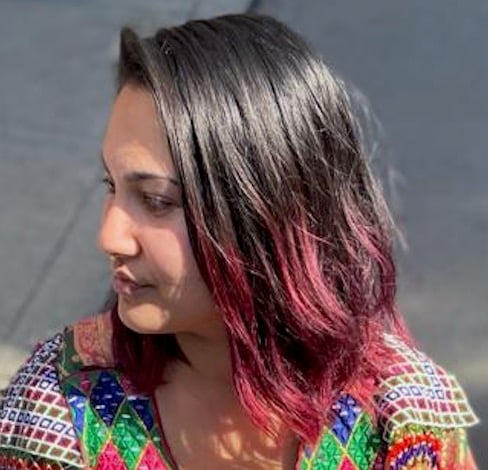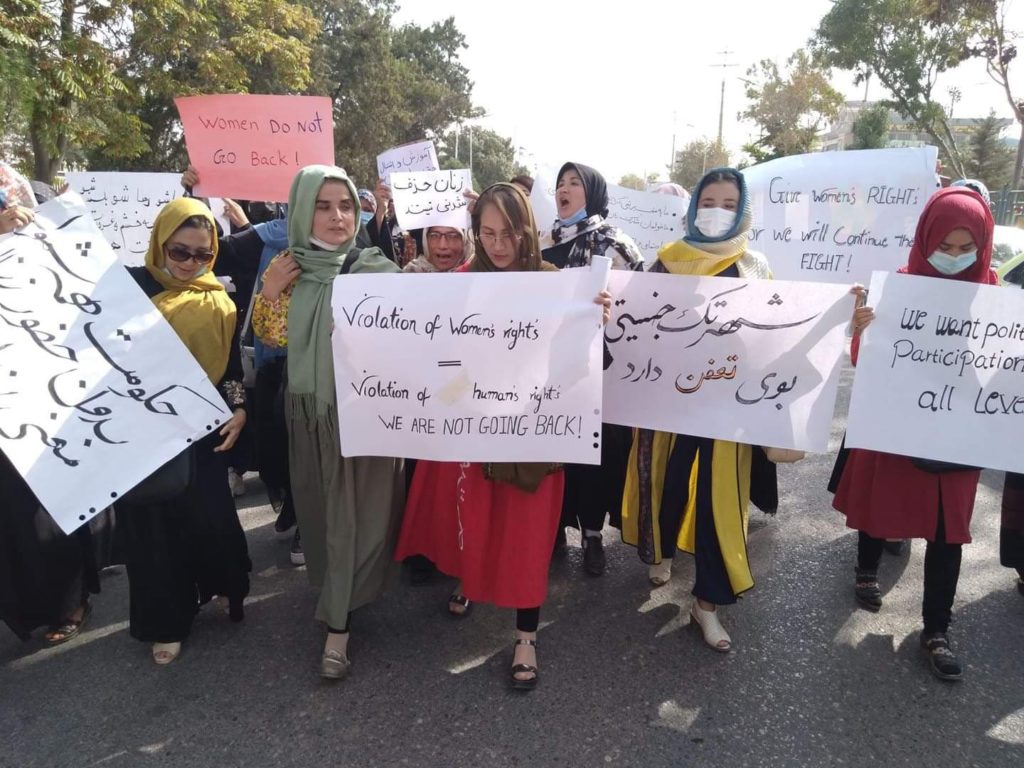As the 20-year anniversary of the so-called “War on Terror” (WoT) approached, I was filled with dread, anger, and immense grief. With the Taliban seizure of Kabul on August 15, and the events and turmoil in Afghanistan that followed, those feelings have only intensified. Alongside this grief, I also hold pride and solidarity with the continued resistance from Afghanistan and all other peoples colonized by the United States – and rage at the imperialist violence that continued for decades amidst what felt like so much silence.
A lot happened after 9/11, but one salient impact on my life was becoming a spokesperson for my people at the tender age of 11 years old. Representing Afghans felt like my one opportunity to humanize and clarify the persistent misinformation that constantly confronted me through ignorant questions, stereotypes, and discrimination. As an 11-year-old, I knew enough to feel resentment that the American public didn’t know anything about our people, thought we were backwards people that needed saving, or all terrorists. Then and still now, I feel the burden of having to demonstrate that my ancestral homeland deserves to exist, and that my people are human and multi-faceted, with a rich history and resistance, and deserve the opportunity to thrive. This is just one of the many ways we have had to bear the weight of structural Islamophobia.
I have come to realize that this xenophobic violence is an essential insurance for the U.S. military project. The masses in the U.S. have known so little about what is happening in Afghanistan – the violence inflicted during the U.S. occupation, and the history of intervention that resourced corrupt, violent leaders and put them in positions of power. The fabricated facade and one-dimensional story that has been used to justify this colonial project has thrived, at the expense of so many lives.
‘War on terror’ spreads worldwide
The WoT opened the door for increased American military intervention and violence in the U.S. and beyond. Hundreds of thousands of people have been murdered around the world. In the United States, communities from the SWANA (South West Asian and North African) region, the Muslim world, and perceived adjacent communities, have experienced law enforcement harassment, entrapment and surveillance, heightened airport profiling and discrimination, interpersonal hate incidents, and detention.
This targeting of communities created the impossible task of demonstrating you were a “good immigrant,” a Muslim that was American enough – if you had the privilege that allowed for it. After the FBI detained a member of my family for hours of questioning and showed up at my home (even questioning me – still 11 years old), my family put up an American flag in front of the house, out of fear. They felt, like many others, that they had to prove that we weren’t “one of them.” In reality, that “them” was an American fabrication. We heard the myth that the U.S. needed to invade with no mention of its covert funding of Al-Qaeda and the Taliban, even paying for textbooks–and no acknowledgement that most Taliban are not Afghan and do not represent Afghan culture and values. This American fabrication also fueled racism within the U.S., with countless assaults and murders of Muslims, or those who appear to be Muslim, rampant discrimination, and people insisting (and enlisting) with fervor because “we had to stop those terrorists.”
In my organizing, I often am struck by how the carceral state uses the same tools as domestic violence: tactics to gain and maintain power and control such as gaslighting, manipulation, economic abuse, escalated harm if you resist, and more. The same parallel applies to imperialism – exemplifying the global reaches of the carceral state – where Afghans were told they needed to be saved, but at the cost of their lives and self-determination.
I see the ways Islamophobia functions to manipulate, “other,” and paint us as deviant as a means to justify imperialism and occupation. For example, American media embraced gendered Islamophobia and securo-feminism in critiquing Afghan gender-based violence. Is baacha baazi (boy play) so different than the rampant child sexual abuse, pedophilia, violence and exploitation in this country, often and especially by men in power? How was the United States trying to gain rights for women in Afghanistan when the American military uses sexual assault as a tool of war, and rapes, murders, and collects the body parts of Afghan people? This is particularly ironic given the rampant sexual assault within the American military, usually followed by retaliating against survivors or sweeping it under the rug, and high rates of domestic violence in the United States (particularly in police and military families). In the same country where police murdered Breonna Taylor, Sandra Bland, Tony McDade, and countless others, that forcibly sterilizes incarcerated people without their knowledge or consent, where exactly is this bastion of gender equality?
They flattened us, made us one dimensional, and framed us as backwards, savage people that needed to be saved because we don’t know any better. And after 20 years (and many more of slightly more covert U.S. intervention in Afghanistan), not only did I internalize some of this racism as a child, but I also didn’t even have access to information about my people. While my ancestral homeland has been occupied for most of my lifetime, while we are consumed by militaristic propaganda, all I learned in school was that Afghanistan had one of the highest numbers of refugees and landmines, but no mention of why and the role of the United States in destabilizing my country.
The pervasiveness and invisibility of gender-based violence is not uniquely Afghan. Muslim, SWANA, and adjacent communities are not inherently more misogynistic or violent than other cultures. The hard truth is that patriarchy is universal, it just manifests itself differently (and was often inserted into these cultures by colonization). I have had to explain these truths countless times.
We resist
There are so many truths to learn that dispel the stereotypes American media has churned out for decades. Afghan resistance exists, led by women, the Hazara community, queer people, and other marginalized communities. The thing that gives me the most hope in this current moment is being able to witness Afghan resistance – journalists continuing to report, public protests led by women yelling in the faces of the Taliban, and the resistance movement in Panjshir. Here in the West, people are finally talking more about the U.S.’ malicious imperial history, and advocating for people to get asylum, donating to Afghan led efforts, and listening to Afghans tell our version of the story.
With current events, the history of American intervention and occupation framed as the WoT, and corresponding Islamophobic propaganda, it felt so important to talk about the full human impact of the past 20 years of American military violence (see our research here). In my experience, I heard conversation around lives lost in Iraq and Afghanistan, profits of military defense contractors, discrimination and deportation, detention, but these were always separate and disconnected. Now seeing them all together, although devastating, helps me wrap my head around the deep, irreversible ramifications of the WoT. It gives me something concrete to explain so much of the pain I feel in my heart, and the heartbreak I feel for our people.
However, we have not been suffering in silence. We have been healing, organizing, and building power to resist. We strive toward liberation even when still caught in tangles of U.S. imperialism, even when it has been rebranded as the WoT. Those in the diaspora like myself must continue to organize in honor of and in partnership with our ancestral homelands, because they are resisting too. Progressive and abolitionist movements in the United States must include an anti-militarist and anti-imperialist lens to truly fight for liberation for all of our people.
I’m sending you all much love, care, and prayer. Together we grieve, and together we rise.
# # #
This article is being co-published with Queer Crescent. See below for a resource list and an excerpt from their infographics series on the War on Terror.

Opportunities to mobilize
Support & Solidarity with Afghanistan (This list is based on current needs, but the situation is evolving, and there are many opportunities to support beyond those we list.):
– Follow, support, and donate to the Revolutionary Association of the Women of Afghanistan (RAWA)
– Support Immigration Equality’s work to help LGBTQ Afghans
– Sponsor an Afghan family applying for humanitarian parole: bit.ly/HPSponsor (costs nothing)
– Help Afghan families with humanitarian parole applications: bit.ly/HPLegal
– Support with the cost of humanitarian parole applications: bit.ly/HPAfghans
– Instagram pages to follow for information, updates, and analysis: @unitedafgassociation, @adeprogress, @blingistan, @missminakabul, @realrawaofficial, @afghania_barakzai, @thebulbulbird, @sincerelynooria, @burquasandbeer
More information:
– Check out the new Muslim Abolitionist Futures website
– Watch the Dissenters event: Abolition Means No War: The New Generation of Anti-Imperialists (you can invite people to join this anti-war org too!)

